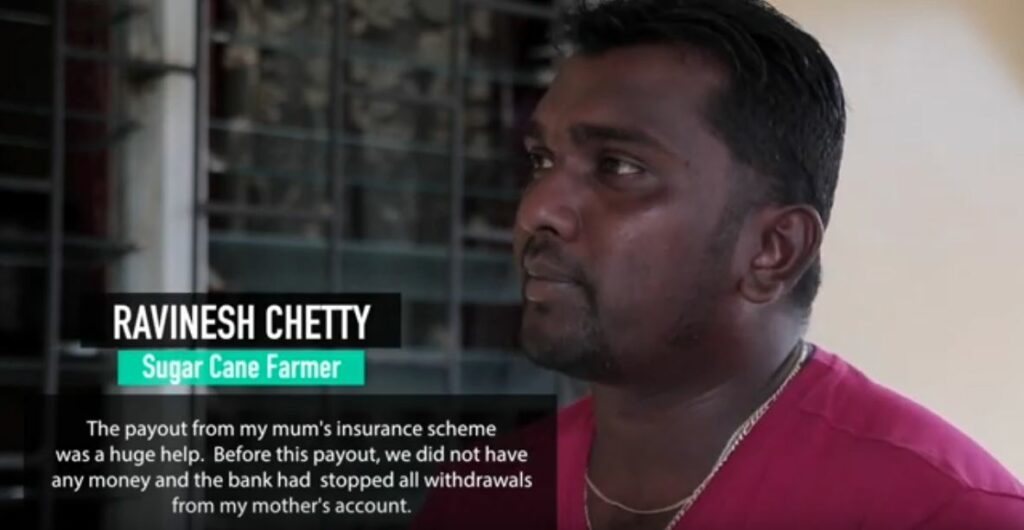Ensuring Smallholder Sugarcane Farmers in Fiji are Insured
Tags
“When my mother passed away, we did not have enough money to pay for the cost of the rituals associated with her funeral,” says Ravinesh Ram Chetty, recounting the week of his mother’s funeral two years ago.
“No one thinks to save for unexpected events like the death of a loved one, so when this happened to our family, we were financially unprepared,” he mentions, describing the financial stress his family felt during that emotional week. The 33-year-old is a sardar (leader) of a sugarcane farming community in Tavua Town in Northern Viti Levu, the largest island of Fiji. In July 2017, Ravinesh, the third-generation cane farmer in his family, inherited the 17-acre farm from his mother Dhan Latchmi Chetty, when she died after a short illness. She passed away during non-cane-cutting months and so her family had to use the money they still had left from the last harvest season. To make matters worse, the family’s main bank account, which was held by their mother, had been frozen by the bank upon hearing of her passing. And in order to access these funds the necessary paperwork first had to be submitted to the bank.
Thankfully, the Chetty family received support from their community, but they still felt the financial strain of the many unexpected costs. Then help arrived in the form of insurance. During the 13-day Hindu funeral rituals, FijiCare Insurance Limited Managing Director Peter McPherson came to the Chetty Estate, together with the Sugar Cane Growers Fund (SCGF) to personally hand over a FJ$1,000 cheque to the family to help with funeral expenses. A week later, the Chetty family received another cheque of FJ$3,000 as a payout from the bundled insurance upon submission of the death certificate to FijiCare. Ravnish’s mother was insured under the new FijiCare bundled microinsurance product.
A product that was launched just three weeks before the passing of Mrs. Chetty. This unique insurance product covers clients for FJ$ 1 a week for funeral and life insurance (FJ$ 1000 + FJ$3000), a personal accident insurance (FJ$3000) and a fire insurance (FJ$3000).
 Link to the YouTube video found here.
Link to the YouTube video found here.
SCGF is committed to show the benefits of insurance
The FijiCare bundled microinsurance is primarily sold to customer groups such as farmers. First the Sugar Cane Growers Fund signed up their 12,000 sugarcane farmers for this product, followed by the dairy, rice and copra farmers through their respective cooperatives. And the Fund committed to paying this insurance for its members for three years.
Now, two years later, FijiCare has already processed claims for 197 sugarcane growers amounting to FJ$752,000.00.
The Fund’s CEO Raj Sharma says that the sugar industry has come a long way in the last two years and the Fund has been actively reaching out to members and creating awareness around the benefits of having insurance through farmer pocket meetings, information events, billboards, radio advertisements and social media.
“Our farmers have been really happy with the product and this has contributed to an increase in participation for the Fund. Many of our farmers have requested the SCGF to expand the suite of insurance products on offer and we are currently in negotiations with FijiCare to purchase medical cover. We are also looking at the age limitations on the current bundled microinsurance scheme.”
Ideally, after this three year period during which the Fund pays for their farmers to be insured, farmers will be convinced of the added value of this insurance product and will from then on pay for the FJ$52 product themselves each year.Sharma believes that, given the positive feedback from members, by June 2020, farmers will pay for their own insurance cover.
Seeing is believing
Initially, sugarcane farmers were skeptical about the decision of the SCGF to partner with FijiCare. They did not trust the product or think they needed insurance.
However, after extensive media coverage and testimonials from the Chetty family and many others about the insurance payouts, farmers saw the benefits of insurance and are slowly starting to change their minds. Each week, more and more farmers are completing their insurance forms at the Fund. This information is needed to ensure a quick pay-out after a claim.
Having benefited from the insurance payout, Ravinesh says he actively promotes the product in his community. “Any chance I get, I talk to my community about the importance and usefulness of insurance, especially when we don’t have savings and an unfortunate event strikes,” he adds.
In the months ahead, efforts to increase awareness on the benefits of insurance to farmers will continue. The UN’s Pacific Financial Inclusion Programme (PFIP) has supported the development of promotional material across the Pacific. In Fiji for instance, a 20-minute documentary was aired on national television, illustrating how low-income islanders are able to better deal with economic shock due to insurance pay outs.
But the best way to increase awareness is the quick payout of a claim as it immediately shows other farmers the added value of the bundled microinsurance to encourage that they start paying for the insurance product themselves from June next year.
This bundled microinsurance product was developed by PFIP in partnership with FijiCare and the SCGF. The scheme is one of PFIP’s many regional efforts to increase the use of financial instruments, especially insurance, to help Pacific Islanders cope with the various financial risks in their lives. This project has been partially funded by the Australian Government and the Russian-Federation, UNDP administered Regional Disaster Resilience in the Pacific Small Island Developing States (RESPAC) Programme.